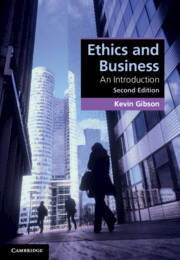Book contents
- Ethics and Business
- Cambridge Applied Ethics
- Ethics and Business
- Copyright page
- Dedication
- Contents
- Preface
- Acknowledgments
- 1 An Overview of Business Ethics
- 2 Insights from Ethical Theory
- 3 Capitalism and Its Ethical Implications
- 4 Responsibility
- 5 Autonomy
- 6 Justice and Equality
- 7 Rights
- 8 Beneficence
- 9 Business and the World
- Select Bibliography and Further Reading
- Index
7 - Rights
Published online by Cambridge University Press: 22 December 2022
- Ethics and Business
- Cambridge Applied Ethics
- Ethics and Business
- Copyright page
- Dedication
- Contents
- Preface
- Acknowledgments
- 1 An Overview of Business Ethics
- 2 Insights from Ethical Theory
- 3 Capitalism and Its Ethical Implications
- 4 Responsibility
- 5 Autonomy
- 6 Justice and Equality
- 7 Rights
- 8 Beneficence
- 9 Business and the World
- Select Bibliography and Further Reading
- Index
Summary
In this chapter, a clear outline is presented for analyzing confusing or contentious rights issues in business dealings. The case of perilous shipbreaking practices is used to invite intuitions about the minimal rights and entitlements that are owed to workers. Positive rights, where actions must be taken, are distinguished from negative ones, where a firm may not interfere with preexisting rights. Human rights are further contrasted to privileges, which come about through a legal framework. Critically, privileges are liable to revocation at any time by legislation, whereas human rights exist outside the legal sphere. Actions by oil firms in the Niger Delta are discussed as examples of different attitudes to the rights of indigenous peoples. Whether sweatshops conditions are ever voluntary or acceptable is also examined. It is noted that some religious views emphasize the common good rather than individual welfare, and rights claims often reflect a Western perspective where personal choice is paramount. Subsequently, the question is asked whether nonhumans or the environment might be rights-holders. The concluding case assesses the notion of privacy and whether it is a human right or simply a legal construct in the internet age.
- Type
- Chapter
- Information
- Ethics and BusinessAn Introduction, pp. 198 - 223Publisher: Cambridge University PressPrint publication year: 2023

